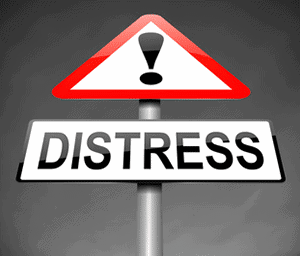Stress Good. Distress Bad.
 Stress is a part of life for 99% of us; it’s how you cope that sets you apart. In many instances, a little stress is beneficial – it can make you focus and sharpen your game. Many of us operate best under stress. If you do your best work close to a deadline, that’s stress helping. So what’s the difference between stress and distress? The answer is simple:
Stress is a part of life for 99% of us; it’s how you cope that sets you apart. In many instances, a little stress is beneficial – it can make you focus and sharpen your game. Many of us operate best under stress. If you do your best work close to a deadline, that’s stress helping. So what’s the difference between stress and distress? The answer is simple:
Stress is something that has a solution. Having an approaching deadline is stress. If you focus and work hard on your paper, you can meet the deadline and that stress goes away. It is often closely followed by feelings of relief, even euphoria.
Distress is something that doesn’t have a solution. Distress is waking up the day after a deadline realizing you completely forgot to submit your paper. Too late, nothing you can do. Distress is losing your cool in a traffic jam on your way to class. There isn’t anything you can do but sit and wait for it to clear. Distress is often closely followed by a sense of despair and/or helplessness!
The real problem with ‘stress’ is when it devolves into its counterpart ‘distress’. While certain levels of stress can be productive, distress is destructive and counter-productive. Make stress work for you, but know your limits. If you know when your body has had enough stress, and you’re reaching the breaking point, give yourself a break by relaxing and ‘de-stress’ before you become distressed.
The most dangerous thing you can do is to let those stress levels build up over an extended period of time. So before you burst into tears (a sure sign of distress), before you start punching your pillow at night, or swearing under your breath, here are a few tips to help stop you from becoming distressed:
- Exercise. A guaranteed way to blow off steam. You don’t have to hit the gym every morning. Even yard work will work your lungs and muscles, improving your health while reducing stress.
- Talk it out. Sharing your stressors and talking about what’s worrying you is often the best way to minimize your anxieties. Talk to your spouse, your friend, your sibling, your parent, your dog…
- Get a pet. Studies have shown that cats and dogs are great stress relievers. Animals are often very predictable and constant in their reaction to their owners. This unconditional love brings out your nurturing side and calms you down. Plus, if you get a dog, you’ll be forced to get in the exercise mentioned in the bullet point above!
- Breathe. Taking a few deep breaths in and out puts everything into perspective. Take a deep breath in, count to 10, and then breathe out.
- Take a bath. Soothing warm water with your favorite music playing in the background can do wonders for the soul – you’ll literally feel the stress oozing out of you as you soak!
- Get involved. Whether it’s joining a community-bowling league or helping the homeless, getting involved allows you to focus on something other than your problems.
If you feel that your stress is starting to devolve into distress, don’t forget our 100% free and confidential Student Assistance Program – ASPIRE – is available to you. The program deals with concerns or problems that may affect your behavioral health, well-being and/or academic performance.
ASPIRE helps our enrolled students and their families with any personal or school-related issues such as stress, financial difficulties, depression, anxiety, family conflicts, relationship issues, and more. Call toll free at 888.470.1531 to speak with a professional by phone and they will work with you to help find a solution that meets your specific needs.